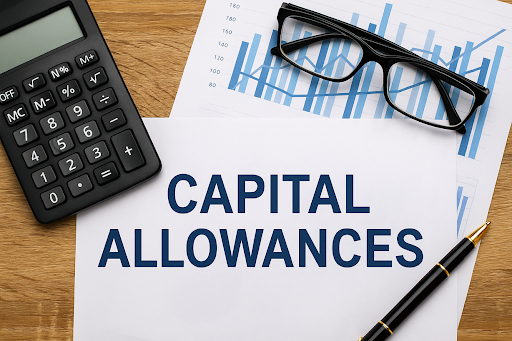In today’s competitive business landscape, companies constantly seek ways to reduce their tax liabilities and increase profitability. One often overlooked but highly effective method is capital allowances. This tax relief allows businesses to claim deductions for certain assets used in their operations, significantly reducing tax bills. However, understanding the intricacies of capital allowances can be challenging, so working with capital allowance specialists can provide businesses with the expertise they need to maximise their savings.
This article will explore how capital allowance specialists can help your business, the key benefits of working with them, and the common mistakes companies make when claiming capital allowances. Understanding capital allowances can unlock significant tax advantages, whether you’re a small startup or a larger enterprise.
What Are Capital Allowances and Why Do They Matter?
Capital allowances are a form of tax relief that allows businesses to claim deductions for certain types of capital expenditure. These expenditures are typically associated with tangible assets like machinery, equipment, and building fixtures. Instead of deducting the full cost of an asset in the year it’s purchased, businesses can claim capital allowances over time, thus spreading the relief across multiple years.
For example, if your business purchases machinery, you can claim a portion of the cost as an expense each year through capital allowances. This reduces your taxable profits and, therefore, the tax your business must pay.
The Role of Capital Allowance Specialists
Capital allowance claims can be complex and time-consuming, especially for businesses with significant assets or property. This is where capital allowance specialists come in. These professionals have the expertise to ensure enterprises can claim the maximum allowable relief under current tax law.

Specialists can help businesses in several ways:
- Identifying Eligible Assets: Capital allowances can be claimed on various assets, including machinery, office furniture, and even integral building parts like heating and lighting systems. However, identifying which assets qualify for capital allowances can be difficult, particularly regarding complex or mixed-use properties.
- Maximising Claims: A capital allowance specialist can maximise the amount you claim by ensuring that all eligible assets are included in your claim. They can also take advantage of available tax incentives, such as the Annual Investment Allowance (AIA), which provides 100% relief on qualifying capital expenditure up to a specific limit.
- Navigating the Legal Framework: The rules surrounding capital allowances are subject to change and can vary depending on the type of asset, its use, and its location. A specialist stays up-to-date with changes in tax law and ensures that your claims comply with the latest regulations.
- Handling Complex Claims: Capital allowance claims can be particularly complicated for businesses with large properties or a wide range of assets. Specialists are adept at navigating the complexities of large-scale claims, ensuring that nothing is missed.
By partnering with a capital allowance specialist, businesses can optimise their tax position and make the most of available tax reliefs.
Common Mistakes When Claiming Capital Allowances
Many businesses fail to claim the full amount of capital allowances they are entitled to. Here are some common mistakes that companies often make when it comes to claiming capital allowances:
- Failing to Identify Qualifying Assets
One of the most common errors businesses make is failing to recognise which assets qualify for capital allowances. For example, companies often overlook integral features of a building, such as plumbing, electrical systems, and lighting, which are eligible for capital allowances. A specialist can help you identify and claim these items. - Not Claiming Past Expenditures
Many businesses only start claiming capital allowances when they are advised to do so, but claims can often be backdated. Companies can sometimes claim assets purchased up to four years ago. If your business has missed claiming capital allowances in previous years, a specialist can help you make retrospective claims. - Incorrectly Calculating Claims
Capital allowance claims require careful calculations, including determining the depreciation of assets over time and applying the correct rate of relief. Mistakes in these calculations can lead to incorrect claims, leaving your business under- or over-claiming. - Ignoring Property-Related Allowances
Capital allowances aren’t just limited to machinery and equipment. Many businesses overlook allowances on the property, such as structural components and fixed equipment. Property-related claims are often more complex and require a detailed analysis to ensure the full value is claimed.
How Capital Allowances Benefit Your Business
Capital allowances provide many benefits to businesses, particularly in terms of tax efficiency and cash flow management:
- Reduced Tax Liabilities
The most direct benefit of capital allowances is reduced taxable profits, which result in a lower tax bill. The larger the claim, the greater the tax savings. This can be a significant advantage for small businesses, freeing up cash to reinvest in the business. - Improved Cash Flow
Capital allowances are a form of deferred tax relief that benefits businesses by spreading the cost of assets over time. This helps improve cash flow by reducing upfront tax liabilities, which is crucial for businesses that rely on cash flow to fund operations. - Increased Investment
With the ability to claim substantial tax relief, businesses are encouraged to invest in new equipment and property improvements. This investment, in turn, can help companies to grow and improve productivity, enhancing overall profitability. - Backdated Claims
As mentioned earlier, businesses can often backdate capital allowance claims, which means that companies can unlock tax savings even for assets purchased in the past. This is a valuable opportunity for businesses that haven’t previously claimed capital allowances.
How Lovell Consulting Can Help with Capital Allowances
Navigating capital allowance claims can be tricky, but with the proper guidance, businesses can unlock significant tax savings. At Lovell Consulting, their team of capital allowance specialists can help you maximise your claims and ensure you’re fully compliant with tax laws. Whether starting a new business, managing a growing company, or overseeing an extensive portfolio of assets, Lovell Consulting offers tailored services to meet your needs.
By working with specialists, businesses can avoid common mistakes, claim all eligible assets, and make the most of available tax reliefs. With expert support, your business can save money, improve cash flow, and reinvest in growth.
Conclusion
Capital allowances are a powerful tool for businesses looking to reduce their tax liabilities and optimise their financial performance. By working with experienced capital allowance specialists, companies can ensure that they claim the maximum amount of relief available. Avoiding common mistakes, identifying qualifying assets, and backdating claims can provide significant tax savings. Partnering with specialists like Lovell Consulting can make a difference for businesses looking to unlock the full potential of capital allowances.


